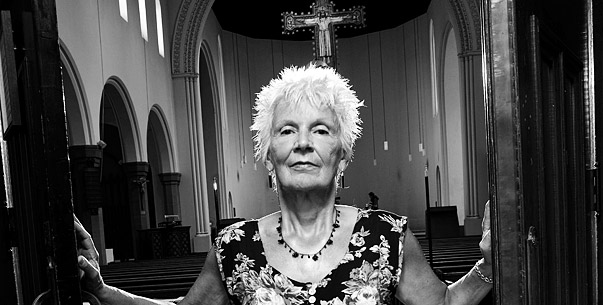|
|
something about Mary
Joanna Manning is calling for a radical reintegration of the feminine in Western culture. Her groundbreaking and sometimes controversial work is proving that positive sexuality can inspire social change. Profile by Talya Rubin.

photo by marianne larochelle
I recently went to a talk by Gloria Steinem, the celebrated feminist author and founder of Ms. magazine, at the Shaare Zion Synagogue in Montreal. The voices of at least 1500 w omen and a handful of men filled the space with a ferocious excitement and a burgeoning energy. Steinem was there to speak about where feminism is today, and at the heart of her talk was the idea that everything we are learning now is a relearning, an awakening of memory. We have forgotten the importance of women in our major religions, as well as in our social and economic structures.
She compared a trip she took down the Nile to a journey through religious history; the further back she went down the river, the more celebrated the sacred feminine was, and slowly there was evidence of God being withdrawn from nature as Greco-Roman civilization took over and introduced monotheism to the region. With this shift, women were seen as creatures to be feared, conquered and dismissed. “Monotheism is the imperialism of religion,” Steinem said, quoting Henry Breasted, the renowned Egyptologist, and in this temple of monotheistic worship there was a resounding agreement of applause from the crowd.
Joanna Manning would certainly agree. Her most recent book, The Magdalene Moment: A Vision for a New Christianity, is all about remembering. According to Manning, the woman we most need to bring back into the centre of our consciousness is Mary Magdalene, one of the most misunderstood women in history. Manning wants us to remember the important role women had in early Christianity; she herself is a former Catholic nun who is now a feminist theologian, a radical activist for marginalized people and an outspoken proponent for reforms in the Catholic Church. Manning sees that right now we are on the cusp of enormous change as a civilization. Unless we reintegrate the feminine, the sexual and the sensual back into the spiritual, Manning thinks we may be heading for disaster.
“The Catholic Church is in deep trouble and deep dysfunction,” says Manning. “We are in a huge shift in our evolution, in our thinking about God that goes beyond all religious dogma. These shifts sometimes take a couple of centuries.” But she is also optimistic that those who are marginalized and disenfranchised are starting to find a voice and work together for change.
Mary Magdalene, one of the most controversial figures in Christianity, was mistakenly characterized as a prostitute and a fallen woman in the Gospels. In the 1960s, the Vatican publicly admitted to this error, after a peasant in southern Egypt had discovered the Nag Hammadi texts in 1945. These texts brought to light a Mary Magdalene who was in fact a close companion to Jesus. She was often referred to as “The Apostle” in the Gnostic gospels, and was the first person to see and announce that Christ had arisen from the dead after his crucifixion.
“Mary Magdalene understood the message of Jesus better than all of the male Apostles,” says Manning. “Jesus put her in charge of the other Apostles to teach them. All the stuff we’ve been told for centuries is a result of an overlay of Greco-Roman patriarchal ideas that came into the Church much later. But in early Christianity, women were in leadership roles.”
Talya Rubin is a writer and actor based in Montréal. Her work has been published in Matrix, Grain and Macleans Online and has won the Bronwen Wallace award for poetry. Talya also creates solo plays for the stage and teaches theatre.
|

